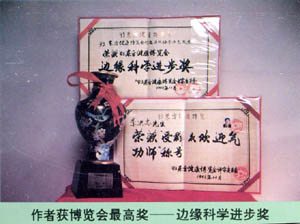(Clearwisdom.net) People who are accustomed to believing in the propaganda of Jiang's state-run media [all media in China is controlled by the government] will invariably think of "overseas anti-China forces" whenever Falun Gong is mentioned.
In fact, since 1994, when Falun Gong began to spread overseas, the Chinese people there have welcomed it. Before the persecution of Falun Gong began in 1999, the Chinese Government actually encouraged the spread of Falun Gong overseas. The Chinese Embassy in France invited Teacher Li to give the first Fa-lecture overseas at the Chinese Embassy's Culture Institute on March 13, 1995. Before 1999, the proclamations and praise of Falun Gong from the overseas community and government agencies were consistent with the Chinese government's attitude. For example, as early as August 3, 1994, Houston, TX awarded Mr. Li Hongzhi "Honorary Citizen" and "Goodwill Ambassador". On October 12, 1996, the mayor of Houston, TX, USA proclaimed October 12, 1996 as Houston's Li Hongzhi Day. Since then, Falun Gong has spread to more than 60 countries. There have also been over 1200 proclamations and resolutions supporting Falun Gong from governments of various countries and NGOs. For example, the congress in the USA passed Resolution 188 on July 24, 2002 and Resolution 304 on October 5, 2004, and the Senate in Australia passed Motion 704 on December 4, 2003 to express their concern about Falun Gong practitioners and to condemn Jiang's regime for persecuting Falun Gong.
Teacher Li Hongzhi receives the awards of the "Most Welcomed Qigong Master" and the "Frontier Science Progress Award," at the Health Exposition in Beijing in 1993.
Falun Gong has received more than 1200 proclamations around the world.
The largest divisions in international community may be related to the political views of each society. However, from Africa and Eastern Europe to Latin America and North America, from South Korea and Japan to Russia and Iceland, all segments of the international community broadly support and praise Falun Gong, indicating that Falun Gong has transcended the boundaries of race and culture, and is unrelated with politics. "Truthfulness, Compassion, and Forbearance" is the cultural treasure of all mankind.
Jiang's state-run media often accuse the international community that supports Falun Gong of "interference in China's internal affairs by anti-China forces". However, an obvious point to remember is that the so called "anti-China forces" could not possibly have known that Jiang was going to persecute Falun Gong before 1999. Thus, what is Jiang's ultimate purpose in linking Falun Gong with the so-called "anti-China forces?"
Jiang Zemin became the paramount leader of Party, administration, and army through political opportunities offered by the former leader, Deng Xiaoping. Jiang clearly recognized the fact that there were many senior cadres who exceeded him in political capital and talent, and that those cadres would not recognize him, except as a political opportunist. At the time Jiang took the stage, Deng Xiaoping had appointed Hu Jintao as the leader to succeed Jiang. This was a rare event in the history of the Chinese Communist Party. So, because of his obstinate desire for power and personal jealousy, Jiang felt extremely threatened by the international praise that Premier Zhu Rongji had received for peacefully handling the 4.25 appeal at Zhongnanhai and the warm welcome that Falun Gong and its founder had received in China and abroad.
According to the tradition of the Chinese Communist Party, the most effective tactic to strengthen power and to eliminate political enemies is to launch a political movement. In every political movement in communist history, some people are isolated from the public as "a minority," and then accused of various crimes and targeted for elimination. It appeared to Jiang that Falun Gong, a peaceful cultivation group that followed the principles of Truthfulness, Compassion, and Forbearance and had no political aspirations, were appropriate candidates to target for his political movement.
According to a document exposed after the event, in 2000, Jiang proclaimed, "Falun Gong believes in 'Truthfulness, Compassion, and Forbearance," which provide us an opportunity to 'eliminate the poison.' In contrast, other Qigong groups are not easy to handle and may possibly cause violent disturbances in the nation. They may even commit homicide, apply poison gas, or make bombs as well other terrorist activities. Falun Gong believes in 'Truthfulness, Compassion, and Forbearance' so our crackdown can be easily conducted. We can use the experience gained in fighting Falun Gong to fight other Qigong organizations."
CNN Chinese Affairs Analyst Willy Lam pointed out in an article entitled, "The High Price of the Crackdown in China," that some members of the Politburo actually did not support the persecution. This is no longer a secret. The article also cited a quote by a senior member of the communist party, "Through launching this political movement, Jiang is forcing senior leaders to express obedience to his political agenda to elevate his power. Jiang Zemin thinks that even though the Politburo has different opinions about how to handle the issue of Falun Gong, its members must publicly express their support of him."
To forcibly push for his persecution of Falun Gong in the Politburo, Jiang Zemin used another tactic: on one hand, he tried his best to describe Falun Gong as a political group supported by the "overseas anti-China force;" on the other hand, he claimed that Falun Gong competes with the communist party for the hearts and minds of the people. After the grand appeal of April 25, 1999, Jiang wrote a letter to the standing members of the Politburo and other leaders. The letter included this statement, "It is hard to believe that communist party members who were armed with the theory of Marxism, materialism, and atheism cannot defeat the stuff spread by Falun Gong?"
The fundamental principle of a CCP member is that the interests of the Party are above the interests of humanity and all the moral standards of humankind. Threatened with the "Annihilation of the Party," other members of the Politburo became silent and yielded to Jiang, even though they did not support the persecution.
In addition, Jiang Zemin brought up fabricated charges that Falun Gong was a political group that was supported by the "overseas anti-China forces." He also realized another personal goal and managed to kill two birds with one stone. His personal decision to persecute Falun Gong practitioners would take on a special meaning--after the success of the persecution, he would become the person who saved the Party during a crisis and would therefore be given an important position in the history of Chinese Communist Party. Thus, the persecution of Falun Gong provided a golden opportunity for Jiang, who lacked and wanted to accumulate political capital and strengthen his position.
Jiang Zemin thought that a group like Falun Gong would immediately succumb at the beginning the persecution; thus the price would not be high. Moreover, the experience of conducting such persecutions accumulated over the years would be more than enough to make any resistor's life worse than death. Thus, a comprehensive persecution of Falun Gong, with all the machinery of the dictatorship, directed by Jiang, was launched. After the official Chinese Communist Party documents were issued to the various levels of the Chinese government, 100 million people (to be consistent with the principle of a "small group", the number of Falun Gong practitioners was officially reduced to 20 million) were classified as a "small group" of second class citizens who were stripped of all rights and freedoms granted by the constitution overnight. The whole country was then coerced to "support" the effort and "take orders" in persecuting practitioners. This persecution, which is all too familiar to anyone in China over 50 years old, has undoubtedly ripped open the deep national wounds from previous movements that had just begun to heal.
December 7, 2004
Views expressed in this article represent the author's own opinions or understandings. All content published on this website are copyrighted by Minghui.org. Minghui will produce compilations of its online content regularly and on special occasions.
Category: Perspectives











